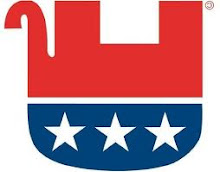
By Karl Rove in the Wall Street Journal
What a difference a month makes. Since November's election, the GOP is three wins, no losses.
The first win came in Georgia, where Sen. Saxby Chambliss crushed his Democratic opponent by 15 points in a run-off election on Dec. 2. The other wins came in Louisiana congressional races on Saturday. One was in a Republican-leaning district in the state's northwest corner. Democrats outspent the GOP three to two and still lost. In the other, Republican Anh "Joseph" Cao defeated nine-term Democrat William Jefferson in a district where John McCain received 24% of the vote.
These victories have boosted Republican spirits. So has Sen. Norm Coleman maintaining a narrow lead in the Minnesota recount, leadership elections that injected new blood into the GOP congressional hierarchies, and a positive race (so far) for Republican National Committee chairman. Republican governors emerged from meeting in Miami energized, optimistic and eager for the 38 gubernatorial races in the next two years.
But many challenges lie ahead. Much of the GOP's work is away from Capitol Hill, governor's offices and party committees. In recent years, Democrats have done a much better job of tending the networks, initiatives and institutions important to political success. There are at least seven important functions, communications channels or institutions the GOP must launch or strengthen.
First, Republicans need something similar to Democracy Corps, a James Carville and Stan Greenberg creation that uses polls that are made public to help party leaders pick themes likely to resonate with voters and draw attention to the Democratic narrative on issues.
Second, while it's the responsibility of all, someone must take the lead on training candidates and party leaders and nurturing their focus on ideas. Under its founder, Newt Gingrich, GOPAC once did this. It needs to be revitalized or its original mission taken up by a fresh group.
Third, more than one out of five Americans eligible to vote is unregistered, meaning there are millions of unregistered Republicans. The RNC once used sophisticated "micro-targeting" to develop a list of 291,000 unregistered Texans who voted in the GOP primary or were registered Republicans in the state or community where they last lived. There were 1.3 million more likely Texas Republicans with no primary voting history. The GOP needs to take this nationwide. New ways must be found to encourage party organizations and independent efforts to focus on registration.
Unions and third-party groups spent $194 million on independent ads for Democrats over the past two years, giving them a five-to-two advantage over similar third-party assistance to GOP candidates. This doesn't include hundreds of millions in unreported expenditures by unions.
So fourth, GOP fund-raisers and allies must create cost-effective independent expenditure groups for House and Senate races, or Republicans will sink under the weight of negative ads, mail, calls and canvassing.
Fifth, there must be a special focus on state legislative races. Legislators elected in 2009 and 2010 will redistrict Congress and themselves in 2011. Today, there are 25 state Senates where either party's majority is smaller than 10 seats and 21 state Houses where the majority is less than 20 seats. In eight states, legislative control is divided, with one party controlling the Senate and the other the House. State parties and congressional delegations have a vital stake in recruiting, training and funding effective legislative campaigns over the next two years.
Sixth, new media require attention. Younger voters are increasingly getting their information from the Web -- twice as many 18-24 year olds get their news online than from newspapers. Political Web 1.0 was about faster and easier communications and Republicans had the advantage. Political Web 2.0 is about networking and Democrats grabbed the lead. The party that figures out where Web 3.0 goes will grab the decisive high ground in high-tech warfare.
Finally, ideas are always the most important currency of politics and never more so than after a party loses. The relationship between GOP policymakers and conservative policy thinkers should be strengthened.
It's not just conservative think tanks. There are independent scholars, academics, staff in governor's offices and state legislatures, and knowledgeable people throughout the country who can help make the party's conservative principles relevant today.
To do this effectively, candidates and party leaders must remember who they need to reach -- young voters who tilt Democratic; Hispanics and Catholics; and suburban and exurban families who were bedrock Republicans, but who have become disenchanted with both parties.
The GOP has the right principles to become the majority party again. What it must have are fresh, energetic voices who apply those principles to meeting the needs of American families. And it must put in place the infrastructure that will take that message and amplify it.
Those are challenging tasks -- but the last month has reminded us that the GOP remains formidable. The age of Obama may have begun, but so, perhaps, has the GOP comeback.
Mr. Rove is the former senior adviser and deputy chief of staff to President George W. Bush.

No comments:
Post a Comment